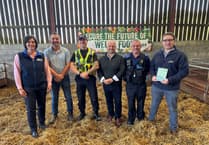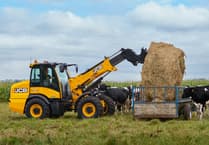Following the announcement of a number of cases of Bluetongue (BTV-3) in south-east England in both sheep and cattle, NFU Cymru is reminding members to remain vigilant and take extra precautions when purchasing livestock.
Bluetongue (BTV) affects sheep, cattle and other ruminants. It is a viral disease spread by biting midges, which affects all ruminants (e.g. sheep, cattle, goats and deer) and camelids (such as llama and alpaca).
BTV-3 is a relatively new strain, first reported in September 2023 in the Netherlands. Over 4,000 cases of BTV-3 have been reported in the Netherlands, Germany and Belgium since May 2024. Cases have also been reported in France, Luxemburg, Switzerland and Denmark. The first case was confirmed in the UK on November 10 2023.
Symptoms vary across ruminants, but include fever, lesions, redness of the mouth, eyes, nose, reddening of the skin above the hoof, excessive salivation and nasal discharge. However, animals may show little or no clinical signs.
It does not affect humans or food safety – meat and milk from infected animals are also safe to eat and drink.
Since August 26 2024, more thqn 50 premises have been affected by bluetongue, with a Restriction Zone and Infected Area now in place covering the counties of Norfolk, Suffolk and Essex. Temporary Control Zones are also in place near Withernsea, East Riding of Yorkshire.
At the time of going to print, there were no confirmed cases of the disease in Wales.
Three vaccines have been given emergency authorisation for use against the disease in England in high-risk areas, these haven’t yet been licensed for use in Wales.
The BTV3 vaccines make no claim to reduce infectivity, but they do appear to reduce mortality and the severity of clinical signs – they will suppress the virus, not prevent it. So, while they won’t stop animals from becoming infected, they could reduce the impact of the disease on individual animals and therefore provide an animal welfare benefit. The use of these vaccines will therefore not ease the movement controls and restrictions that farmers are dealing with in the Restricted Zone.
Under the current rules, farmers in Wales will not be able to move BTV-3 susceptible animals from inside the Restricted Zone into Wales to live. Germinal products like semen cannot be frozen within the zone and existing material cannot be moved out, except under license.
Livestock will be allowed to move under license (containing strict disease control conditions) directly from the zone to Wales for slaughter at one of four designated abattoirs. This is considered a low risk move and is vital in maintaining Welsh abattoir viability.
NFU Cymru is working with other industry stakeholders to inform and shape the Welsh Government response to BTV-3. We are also liaising closely with NFU colleagues in England, who are helping members on the ground in the higher risk counties, to ensure lessons can be learnt from their experience and the spread of this disease is minimised.
Bluetongue is a notifiable animal disease. If you suspect it, you must report it immediately. Failure to do so is an offence. For suspected cases in Wales telephone 0300 303 8268.
Please visit the NFU Cymru website for more information and the most recent up to date position regarding Bluetongue.





Comments
This article has no comments yet. Be the first to leave a comment.